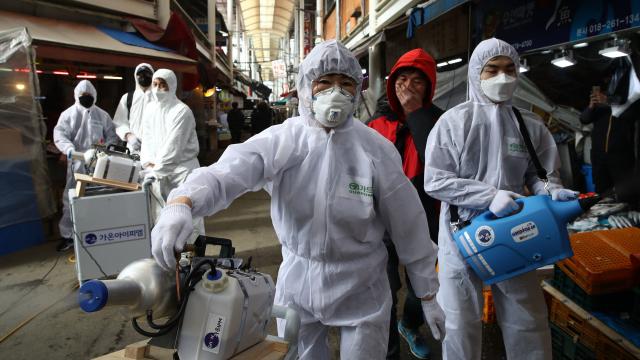Amazon is warning third-party sellers on its Marketplace platform not to gouge customers on protective face masks as the Wuhan coronavirus outbreak continues to spread internationally and becomes increasingly likely to hit the U.S., emails obtained by Wired show.
The effectiveness of the masks as a preventative measure against infection by the coronavirus, a novel virus called SARS-CoV-2 which causes a disease called COVID-19, is unclear. (A prior review of studies conducted by Canadian researchers found the evidence as to whether they are effective against the similar SARS virus and RSV was split, though other research has shown they may lower infection risk). Proper handwashing and avoiding contact with infected individuals is probably more important, and the Centres for Disease Control isn’t currently advising the general public wear masks. But prices for masks have tripled and in some cases quadrupled on Amazon, Wired wrote, with Amazon telling some sellers that their listings are “not in compliance” with policies that ban price-gouging.
Typically this policy is enforced during the holiday season when there are shortages of popular gifts, though price-gouging on Amazon during previous crises has been an issue (such as elevated prices for water before the impact of Hurricane Irma). As Wired noted, many states have laws against raising prices of basic goods during emergencies, which the outbreak is after the feds declared a public health emergency last month.
“This is a hard one for Amazon, because they do not want its customers to be taken advantage of,” Ed Rosenberg, a consultant who works with Amazon sellers, told Wired. “But there is also supply and demand, and sellers should be able to charge more if they pay more and demand is high.”
Amazon’s issues aren’t limited to price gouging on face masks. The third-party merchant section of the site has been flooded with dubious products claiming to protect against or “kill” the virus. The Better Business Bureau has issued a warning to consumers to watch out for “low-quality or counterfeit masks” or outright scams on online stores.
It’s not clear how strictly Amazon will enforce the policy. According to Wired, one consultant said that some overpriced mask listings have been deleted from Amazon, though the Verge wrote there haven’t been any platform bans. Prices on Amazon remain high. The top-selling listing in the medical face masks category, for 100 blue disposable masks, was at $US16.99 ($26) plus $US4.99 ($8) shipping on Tuesday evening, which is several times the price weeks ago and actually higher than the already-elevated rate quoted in the Wired article ($US15 ($23)). That appears to be on the low end, with other sellers jacking up rates to several times that.
The U.S. only has around a dozen confirmed cases of the virus, whereas there have been 80,000 confirmed cases globally (in all likelihood a major underestimate) and over 2,700 deaths. Major SARS-CoV-2 outbreaks are now occurring in South Korea, Italy, and Iran.
CDC officials have now said there is little question that given its rapid spread around the globe it will eventually spread throughout communities stateside. National Centre for Immunization and Respiratory Diseases director Dr. Nancy Messonnier said on Tuesday that officials “are asking the American public to prepare for the expectation that this might be bad,” with Health and Human Services Secretary Alex Azar saying 300 million masks are needed for health care workers (just 30 million are currently stockpiled). According to the Washington Post, hospitals are already blazing through their supplies of higher quality N95 masks, raising the prospect of a shortage at hospitals.
That’s just in hospitals. Individuals looking to buy their own will face a supply shortage on the open market, as factories in China—the mask supplier for much of the world—are operating at reduced capacity and are pressed hard to meet domestic demand. Weeks ago, CNN reported that the National Community Pharmacists Association survey results had found 96 per cent of U.S. pharmacies were experiencing mask shortages. Hoarding by nervous Americans could contribute to shortages where they are most needed, like hospitals and clinics.
Financial markets and forecasters appear to anticipate the coronavirus outbreak will hit the global supply chain hard if it results in rolling lockdowns across the world, as has already happened in China. That could result in shortages of other goods; the New York Times has noted the example of shutdowns of plants in Italy, one of which is an auto parts manufacturer that supplies factories across Europe. Amazon has already warned sellers that the spread of the virus may result in order cancellations or account holds due to disruption.
